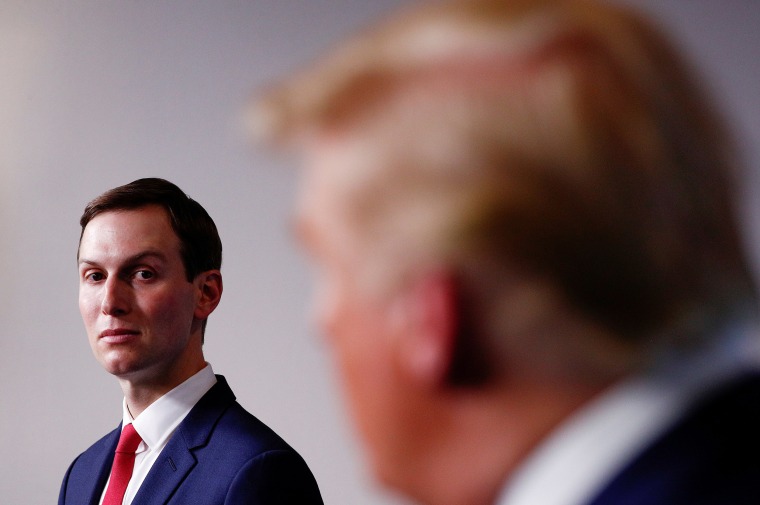It was nearly two months ago when Politico first reported that Jared Kushner was taking on a key role in guiding Donald Trump on combating the pandemic. CNN's White House correspondent added the same day that Kushner is "becoming more involved" in the administration's coronavirus response, with one source telling the network that the president's young son-in-law is "in total control."
It wasn't long before Kushner was reportedly leading a "shadow task force" of his own, which had the effect of "causing confusion among many officials involved in the response."
As it turns out, that was far from the only problem. The Washington Post reported yesterday:
The coronavirus response being spearheaded by President Trump's son-in-law, Jared Kushner, has relied in part on volunteers from consulting and private equity firms with little expertise in the tasks they were assigned, exacerbating chronic problems in obtaining supplies for hospitals and other needs, according to numerous government officials and a volunteer involved in the effort.
The article painted a rather brutal portrait, including allegations that Kushner's team, which set out to secure personal protection equipment, "had little success in helping the government secure such equipment, in part because none of the team members had significant experience in health care, procurement or supply-chain operations." Worse, "none of the volunteers had relationships with manufacturers or a clear understanding of customs requirements or Food and Drug Administration rules."
The New York Times ran a similarly unflattering report highlighting a blistering memo from a whistle-blower who accused members of Kushner's team of doing work that was "plagued by frequent changes in process, efforts that turned out to be wasted, poor communication and mounting dread about their lack of progress."
The Times' article pointed to, among other things, Dr. Jeffrey Hendricks, a South Carolina physician who "had longtime manufacturing contacts in China and a line on millions of masks from established suppliers." When he reached out to FEMA with an offer to help, the doctor was diverted to "a team of roughly a dozen young volunteers, recruited by the president's son-in-law, Jared Kushner, and overseen by a former assistant to Mr. Kushner's wife, Ivanka Trump."
Dr. Valerie Griffeth, an emergency room doctor in Oregon and a founder of Get Us P.P.E., a volunteer effort to match available medical supplies with hospitals and emergency workers, told the Times, "To bring in inexperienced volunteers is laughable when there are professional logistics experts in government who could have helped with procurement and distribution and get us the supplies we need."
Quite right. It appears that Kushner, convinced of the superiority of private-sector outsiders, believed he could teach government bureaucrats a thing or two by turning to consulting and private equity firms to get the job done. Except, that didn't work -- because those government bureaucrats actually understand the health care procurement process in ways the president's young son-in-law and his pals from the corporate world do not.
But that's not the only lesson that's emerged from this unfortunate turn of events. The other larger takeaway is that it's a mistake to keep giving Jared Kushner so many important things to do. As regular readers know, Trump's inexperienced son-in-law has an almost comically broad policy portfolio, featuring incredibly complex challenges that even experienced officials -- those who actually know what they're doing -- would find difficult.
Trump has tasked Kushner with tackling, among other things, foreign policy, trade policy, criminal-justice reform, infrastructure, "reimagining" the Veterans Administration, tackling the opioid crisis, striking a Middle East peace agreement, building a border wall, and more recently, procuring PPE during a pandemic.
Given his paltry lack of successes, maybe it's time to give other, more experienced public officials a try?

